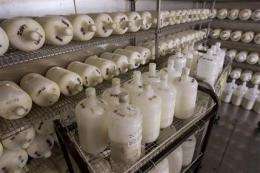Experts say don't worry about radiation in US milk

(AP) -- So now Japan's radioactive fallout is showing up in milk on the U.S. West Coast. Not to worry, though. It turns out that traces of radioactivity are in many foods we eat, the air we breathe and the water we swim in.
Based on current radiation levels leaking from the stricken Japanese nuclear plant, experts say it's very unlikely that health problems will develop in the United States and other places far from Japan.
"This amount of radiation is tiny, tiny, tiny compared to what you get from natural sources every day," said John Moulder, a professor of radiation oncology at the Medical College of Wisconsin in Milwaukee who studies the effects of radiation exposure.
That radioactive fallout is turning up in food and water is hardly a surprise. Very low levels of radiation in the air connected to the Japanese plant have shown up coast to coast in the U.S., as well as in Iceland, Britain and Germany.
Most of the radioactive material disperses in the atmosphere, but some falls to the ground.
Radioactive iodine was found in the milk in California and Washington state, most likely after a cow ate tainted grass or drank puddles of rainwater containing it. Iodine-131, the type that was found, is short-lived and decays fairly quickly, becoming harmless.
Moulder said he wouldn't be surprised if leafy vegetables like spinach are next to show contamination, the source being rainwater. Again, the health risk "is about as close to zero as you can get," he said.
Since this type of iodine is manmade, it isn't normally found in the environment. But we're exposed to natural sources of radiation every day - most of it from radon in the air and, to a lesser extent, from cosmic rays.
Foods we eat also contain low levels of naturally occurring radioactivity, including bananas, carrots and red meat. Even beer has it.
"Once you understand that we swim in this low-level sea of radiation, then it's just a numbers game," said Mike Payne of the Western Institute for Food Safety and Security at the University of California, Davis.
The Environmental Protection Agency normally tests milk, rainfall and drinking water every three months for radiation.
Since the March 11 tsunami that devastated parts of Japan and crippled the nuclear plant, the EPA began testing more frequently and screened samples from milk producers this week.
A small amount of radioactive iodine was found in a March 25 milk sample from Spokane, Wash. The amount detected was 5,000 times below the federal recommended limit for exposure.
In separate testing, the California Department of Public Health found a similar trace amount Monday at a dairy in San Luis Obispo County, where the Diablo Canyon nuclear power plant is located.
The department has an ongoing program that checks milk for radiation levels and occasionally tests vegetables grown near power plants. Since the Japan nuclear crisis, it started testing milk samples in the county each week.
"It is safe to drink milk. It is safe to eat dairy products," county Health Officer Penny Borenstein said at a news conference Thursday.
The Food and Drug Administration, which oversees the safety of the nation's food supply, said that so far it has not found radiation in any other foods.
To the north, health authorities in British Columbia said radioactive iodine levels recently found in rainwater and seaweed do not pose a health threat.
The United States had already banned imports of dairy and produce from the region of Japan where the crippled plant is located. Other foods imported from Japan, including seafood, are still being sold but are screened first for radiation.
"People shouldn't be afraid to continue eating dairy products, vegetables, fish and other nutritious foods," said Christine Bruhn, who studies food safety at UC Davis.
©2010 The Associated Press. All rights reserved. This material may not be published, broadcast, rewritten or redistributed.


















